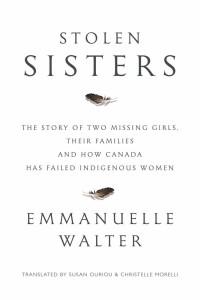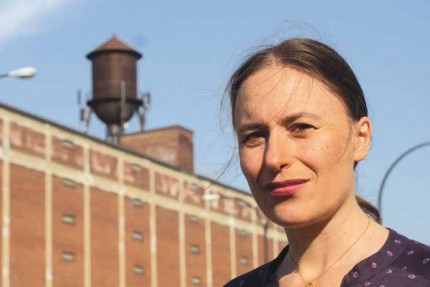 The end of September brought the publication of two very different books about Indigenous issues in Canada. The first, Wab Kinew’s memoir, The Reason You Walk, is ultimately celebratory, and speaks to a wide audience of Indigenous and non-Indigenous people across Canada and the US. The second, Emmanuelle Walter’s Stolen Sisters, is a much darker book intended to shake the non-Indigenous public out of their ignorance and apathy about the issue of missing and murdered Indigenous women.
The end of September brought the publication of two very different books about Indigenous issues in Canada. The first, Wab Kinew’s memoir, The Reason You Walk, is ultimately celebratory, and speaks to a wide audience of Indigenous and non-Indigenous people across Canada and the US. The second, Emmanuelle Walter’s Stolen Sisters, is a much darker book intended to shake the non-Indigenous public out of their ignorance and apathy about the issue of missing and murdered Indigenous women.
Together they form a portrait of this particular moment in Canadian-Indigenous relations. On one hand, some of the first generations to avoid residential schools are coming to take the reins of Indigenous leadership and embracing their languages and traditions. On the other, the reality of systemic racism continues to create an environment from which women disappear and are murdered with virtual impunity.
Wab Kinew’s book deals with darkness as it tells of the internment and abuse of his father in residential school. He then follows his father – Dr. Tobasonakwut Kinew – through the painful fight against cancer that came at the end of his life. It also contains a retelling of Wab Kinew’s dark years, during which he was heading toward addiction and self-destruction. What turned both of them around, he says, was the comfort and power of traditional Anishinaabe spirituality, in the form of sweats, Sundances, ceremonies, songs and the revitalization of the Anishinaabemowin language.
“It’s my face on the cover and it’s my memoir,” Wab Kinew told the Nation, “but my father is the hero of it, and his story is the arc of the book.”
From the child punished in residential schools for practicing Anishinaabe traditions at the funeral of his own father, Tobasonakwut Kinew grew to become an internationally renowned figure. He famously presented Pope Benedict XVI an eagle feather to measure his willingness to embrace Indigenous spirituality on the occasion of the Vatican apology for residential schools. His son finds in that life much to meditate upon about the issue of reconciliation – an idea he says we witness more as a word than an action.
“We often think of ‘reconciliation’ as a term that applies to trying to fix a relationship between Indigenous people and the rest of Canada,” Wab Kinew said. “And it does. But it’s also much bigger than that. In this book there is that form of reconciliation, but there’s also the reconciliation between different faiths, and reconciliation between generations in a family. Eventually there’s the reconciliation with the loss of loved ones after they leave this world.”
Wab Kinew noted that reconciliation is a state that can only occur, for example, when the party with the power has stopped harming the party with less power.
“If the residential schools were still open, I wouldn’t be talking about reconciliation,” he said. “There’s a lot in the book where it seems like I’m pumping the brakes on reconciliation, but that’s because I don’t want to ignore the reality of the situation. Sometimes we do have to call a spade a spade and be honest about the work that needs to be done by the people or the person on the other side of the relationship.”
Wab Kinew chronicles his father’s and his own increasing commitment to Anishinaabe spiritual practice, recounting his experiences of ceremonies and Sundances in loving and exquisite detail. That was, he said, very much on purpose, beginning from the problem that most non-Indigenous Canadians have little in the way of concrete ideas about what it means to be Anishinaabe, or Indigenous in general.
“I don’t know that the average Canadian has a deep understanding of the beauty and the strength of First Nations and Indigenous culture and why those of us who are traditional hang on so dearly to those things,” Wab Kinew said. “Spirituality is able to turn somebody’s life around when they’re suffering from inconsolable grief, or when they’re on a self-destructive path because there’s something much bigger than yourself that happens in that circle.”
No stranger to controversy, Wab Kinew takes a strong stand on the issue of Indigenous voting.
“A lot of people are talking about getting rid of Harper,” he observed. “But it’s bigger than that. That’s a step, but it’s about starting to exercise your political muscle so that not just this time, but in every future election, politicians listen to you and talk about your issues. If you’re against Harper, you’re not going to beat him with a protest or a revolution. You’re going to beat him by showing up on October 19 and voting his candidates out of office.”
That sentiment is likely one that French journalist Emmanuelle Walter shares, judging by Stolen Sisters, her book-length report on missing and murdered Indigenous women. Though she immigrated to Canada only five years ago, Walter was quickly immersed in the story of Maisy Odjick and Shannon Alexander, two residents of the Algonquin Nation of Kitigan-Zibi who went missing from nearby Maniwaki and were never seen again.
When she moved to Canada, Walter said, she first began hearing of the issue of missing and murdered women – a subject that shocked her enormously.
“I really thought of Canada as a country respected for its human rights record, [a place that] was very different from the United States,” she said. Soon, the subject “became an obsession. I began to read and read. My husband told me I should write a book. I’ve written several books [in France], but this one was the most emotionally moving.”
Soon she was visiting Kitigan-Zibi and spending time with the family and friends of the missing girls, profiling both the community and its individuals in their attempt to deal with their grief at the loss. She writes the book in the first person, bringing the reader along as she meets the families of the girls and the community police who looked for them (who many community members say didn’t look hard enough).
As the topic opens up, the issue of systemic racism appears more and more prominently. Police assume the girls ran away because they believe that’s what Native girls do, even though neither had any reason to, and both left their wallets behind. Politicians claim that any missing and murdered Indigenous women are essentially responsible for their own murders if they use drugs or are involved in sex work. These assumptions contain what Walter pointed out was a racism she encountered even among her progressive friends in Montreal when she began the book.
 “Month after month writing this book I felt really alone,” she said. “People told me, ‘It won’t work. Nobody cares. It’s not a popular cause.’ Even left-wing people told me that! People would be more interested in Palestine than going to a reserve! They see the poverty as ongoing, and they don’t know what to do. They feel powerless and exasperated, so they say, ‘We’re not interested in that issue: it’s too much, it’s too hard.’”
“Month after month writing this book I felt really alone,” she said. “People told me, ‘It won’t work. Nobody cares. It’s not a popular cause.’ Even left-wing people told me that! People would be more interested in Palestine than going to a reserve! They see the poverty as ongoing, and they don’t know what to do. They feel powerless and exasperated, so they say, ‘We’re not interested in that issue: it’s too much, it’s too hard.’”
The good news, she said, is that following the publication of the book in French last year, it opened a long overdue discussion in Quebec about Indigenous issues. Walter said she was being approached for interviews once a week or more, even appearing on the flagship Radio-Canada program Tout le monde en parle. It seems, she said, like Quebec is beginning to wake up to its own colonial history.
“When you read Quebec history, Quebecers were [dominated] by the English,” she said. “So now Quebecers say they’re colonized by the English, and that means they can’t be the bad people. But in the reception of my book, I was surprised that people were willing to recognize that problem.”
In Quebec, she noted, 70% of Indigenous people live on reserve, and in many cases do not interact much with settler communities. This divide encourages Quebecers to believe that they do not carry the burden of colonialism the way that English Canada does.
“We don’t see them, and so we think we are the colonized. We have the fantasy that in the fur trade time, we were close to them! We were friends and equal and we were so open minded – Quebec people have a special relationship to this issue, that’s for sure.”


